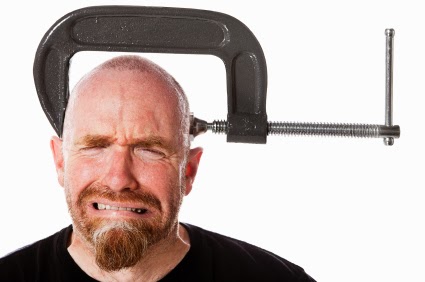December 8, 2014

12 percent of Americans suffer from migraines. One in four families has an affected member. If you or anyone you know suffers with migraines, you know how much time and life is lost waiting for the pain to subside.In addition, after the headache is over there is often a period of fatigue, poor concentration or mood changes.
The pain of a migraine can be so searing you may feel like drilling a hole through your head. In fact, this was the remedy of choice 3,000 years ago when evil spirits were thought to be the culprit behind migraines.While there are plenty of drugs that combat migraines, no magic bullet exists.
Many migraines have multiple causes, including irritation on the nervous system from the joints of the neck (cervical spine), jaw (TMJ), and head (cranial bones). Chronic strain on the muscles of the head and neck from poor posture or bad movement habits also contribute to migraines. TOO MANY PEOPLE WHO MAY BE HELPED BY CHIROPRACTIC CARE DON'T KNOW IT!
Our treatment approaches include: 1.Adjustments to the neck, jaw, and head (cranial work); 2. Muscle and fascial release (Active Release Techniques or ART, trigger point stimulation, myofascial release); 3. Posture correction exercises and other exercises; 4. Education about job modifications; 5.Co-management with other health care providers, if medication or injection therapy is needed. People in chronic pain, such as migraine headaches, often have bad outcomes. Below is one such story:
Music legend Ian McLagan has died of complications related to a stroke. He was discovered in his home in Manor last night after he failed to show up for a band rehearsal. He was 69. McLagan was rushed to University Medical Center Brackenridge and placed on life support. He passed away this afternoon at 2:39. "He was a beloved friend to so many people and a true rock n roll spirit," McLagan's manager Ken Kushnick said in an e-mail. "His persona and gift of song impacted the music across oceans and generations."
Though the British Invasion may have led the way, the Small Faces weren’t far behind in the 1960s, with a pounding pub rock driven by McLagan’s keyboard. McLagan’s Hammond B3 swirl would also drive the sound of Rod Stewart and Faces in the 70’s. In later years, McLagan made his home in Central Texas, rekindling his career both as a solo artist and a sought-after sideman recording with the Rolling Stones, Bruce Springsteen and Bob Dylan, among many others.
In recent years, McLagan had undergone a series of treatments for debilitating migraines. "I've been on about five, six medications over the period of the last 9, 10 years," he told KUT in 2010. "I was starting to feel suicidal."
"I walked on the stage of the Lucky Lounge one Thursday night and didn't know what the hell I was doing. I started one song about four, five times. I made a joke out of it, but I knew it was the medication and I decided I was going to stop it," McLagan said. "I never took it again, and I actually should have [instead] slowed it down." "I've taken all kinds of medications. Nothing really does it, frankly. Honestly, I think pot is the only that's a real distraction for me and I wish they'd make it legal," he said. McLagan was set to begin a tour with veteran rocker Nick Lowe in Minneapolis.
http://kut.org/post/music-legend-ian-mclagan-dead-69






